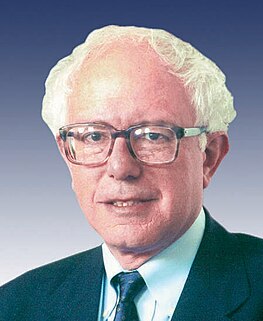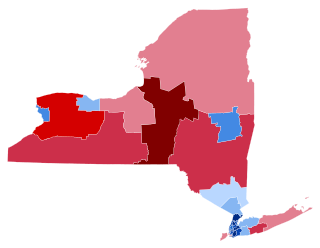A write-in candidate is a candidate in an election whose name does not appear on the ballot, but for whom voters may vote nonetheless by writing in the person's name. The system is almost totally confined to elections in the United States. Some U.S. states and local jurisdictions allow a voter to affix a sticker, with the write-in candidate's name, to the ballot in lieu of actually writing in the candidate's name. Write-in candidacies are sometimes a result of a candidate being legally or procedurally ineligible to run under his or her own name or party; write-in candidacies may be permitted where term limits bar an incumbent candidate from being officially nominated for, or being listed on the ballot for, re-election. In some cases, write-in campaigns have been organized to support a candidate who is not personally involved in running; this may be a form of draft campaign.

The New York City mayoral election of 2005 occurred on Tuesday November 8, 2005, with incumbent Republican mayor Michael Bloomberg soundly defeating former Bronx borough president Fernando Ferrer, the Democratic nominee. They also faced several third party candidates.
James Donald "Jimmy" Griffin was an American politician who served in the New York State Senate and then for 16 years as the Mayor of Buffalo, New York (1978–93). He later returned to public life serving as a member of the Buffalo Common Council.

Byron William Brown II is the 62nd and current mayor of Buffalo, New York, elected on November 8, 2005 and is the City's first African-American mayor. He previously served Western New York as a member of the New York State Senate and Buffalo Common Council. He was the first African-American politician elected to the New York State Senate to represent a district outside New York City and the first member of any minority race to represent a majority white New York State Senate district.

The 2006 United States Senate election in Vermont was held November 7, 2006. Incumbent independent Senator Jim Jeffords decided to retire rather than seek re-election to a fourth term in office and Bernie Sanders was elected to succeed him.

The New York gubernatorial election of 2010 was held on Tuesday, November 2, 2010. Incumbent Democratic Governor David Paterson, elected as Lieutenant Governor in 2006 as the running mate of Eliot Spitzer, chose not to run for a full term. Democratic New York Attorney General Andrew Cuomo defeated Republican Carl Paladino to become the next Governor of New York.

A mayoral election took place in Buffalo, New York on November 3, 2009. Incumbent Democratic mayor Byron Brown won re-election to a second term.

The 2010 congressional elections in New York were held on November 2, 2010 to determine representation in the state of New York in the United States House of Representatives. New York has 29 seats in the House, apportioned according to the 2000 United States Census. Representatives are elected for two-year terms; those elected will serve in the 112th Congress from January 3, 2011 until January 3, 2013.

A 2011 special election in New York's 26th congressional district was held on May 24, 2011 to fill a seat in the U.S. Congress for New York's 26th congressional district. The vacancy was due to the February 2011 resignation of married Republican Chris Lee who resigned amid a scandal involving flirtatious emails and a shirtless picture he had sent to a woman he met on Craigslist. Four candidates competed in the election: Republican New York State Assembly member Jane Corwin; Democrat Erie County Clerk Kathy Hochul; Green Party candidate Ian Murphy, editor of the Buffalo Beast; and independent candidate Jack Davis, a businessman running on the Tea Party line. Hochul was projected as the winner of the race with a plurality of the vote on election night.

The 2014 New York gubernatorial election took place on November 4, 2014.

The 2013 Pittsburgh mayoral election took place on November 5, 2013. Democrat Bill Peduto was elected the 60th Mayor of Pittsburgh, Pennsylvania. The primary election was held on May 21, 2013. Incumbent Democratic Mayor Luke Ravenstahl, although eligible for a second full term, did not seek reelection as Mayor of Pittsburgh.

The 2014 United States House of Representatives elections in New York were held on Tuesday, November 4, 2014 to elect the 27 U.S. Representatives from the state of New York, one from each of the state's 27 congressional districts. The elections coincided with other elections to the United States Senate and House of Representatives and various state and local elections, including the Governor of New York, Attorney General of New York, and Comptroller of New York.
The 2014 United States House of Representatives elections in Virginia were held on Tuesday, November 4, 2014, to elect the 11 members from the state of Virginia to the United States House of Representatives, one from each of the state's 11 congressional districts. On the same day, elections took place for other federal and state offices, including an election to the United States Senate. Primary elections, in which party nominees were chosen, were held on June 10, 2014.

The 2013 election for Mayor of Buffalo, New York took place on November 5, 2013. Two-term incumbent Mayor Byron Brown, a Democrat, faced Republican challenger Sergio Rodriguez.

The 2001 election for Mayor of Buffalo, New York took place on November 6, 2001. Incumbent Anthony M. Masiello, a Democrat, easily trounced his sole opponent in the primary, going on to win a third term with no serious opposition in the general election. Buffalo's 2001 mayoral election was notable for its uncharacteristic quietness, despite pressing issues such as allegations of environmental contamination in the Hickory Woods neighborhood of South Buffalo and chronic poverty and urban blight. This was speculated as being due to reticence on the part of would-be candidates to "challenge a powerful and well-liked mayor like Masiello", especially one with a campaign fund in excess of $1 million. It was also only the second time in history when the Democrats and Republicans endorsed the same candidate for mayor of Buffalo, a phenomenon made possible by New York State's electoral fusion law.

The 2017 Pittsburgh mayoral election took place on November 7, 2017. The primary election was held on May 16, 2017. Incumbent Democratic Mayor Bill Peduto successfully ran for re-election to a second term. Three Democrats, including Peduto, and no Republicans filed petitions to appear on the respective primary ballots before the deadline on March 7, 2017. Peduto won the Democratic primary and was officially unopposed in the general election.

The 2018 New York gubernatorial election occurred on November 6, 2018. Incumbent Democratic Governor Andrew Cuomo won re-election to a third term, defeating Republican Marc Molinaro and several minor party candidates. Cuomo received 59.6% of the vote.

The 2018 Louisville mayoral election was the fifth quadrennial Louisville Metro mayoral election, held on Tuesday, November 6, 2018. The Democratic ticket of incumbent mayor and businessman Greg Fischer was elected to his third and final term. He defeated the Republican ticket of engineer and former Louisville Metro Councilwoman Angela Leet.


















